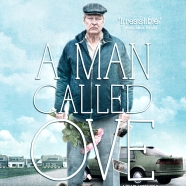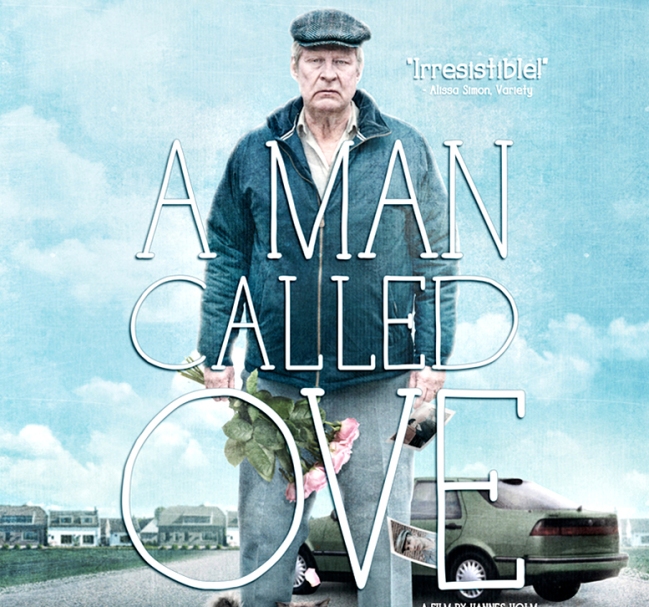 February
24
February
24
Tags
A Man Called Ove (2016)

The cranky old man stereotype is universally found in fairy tales and films and are abundant in real life. They are easy targets to laugh at, pity, or to incite fear, and their grumpiness, loneliness, and declining relevance fuels their image. As if aging itself was not undignified enough, old men are also often depicted as mad or heading in that direction. In this context, A Man Called Ove (2016) is an unusually sympathetic, darkly funny, and insightful essay on the inner life of a lonely old man, playfully blended with themes of multi-culturalism in homogenous Swedish society.
Ove (Rolf Lassgard) is the self-appointed superintendent of rules and manners in a small Swedish neighbourhood where everyone knows everybody. Having recently lost his wife to cancer and then retrenched after a lifetime on the railways, he is seriously suicidal. He fills his time by policing minor breaches of community rules with his gruff rebukes that keep the neighbourhood orderly. His daily patrols, helping the neighbours, and visiting his wife’s grave are the only things keeping him alive. His tormented peace is disturbed when a noisy Iranian family move in next door. Even worse, they seem to be lovely people with nice children and they bring gifts of friendship at inconvenient times. Their arrival temporarily distracts Ove from his death-wish and whenever he readies the noose he is again interrupted by someone who needs him. Ove is always helping others while his own inner turmoil goes unrecognised.
This simple, uneventful plotline is merely the picture frame for one of the most poignant portraits of grief you will find on film. While there is comedy aplenty in watching Ove relate to others, the deeper layers are anything but funny. The emotional pivot points of the story are Ove’s grief and his promise to soon join his wife. If you are looking for comedy it is easy to miss glimpses of his deep despair mixed with his undiminished love for his wife. The acting comes from the school of understated realism and it avoids the melodrama that usually accompanies the grief genre. With deadpan Swedish gravitas, the most ordinary gesture, like Ove looking at his wife’s photo or chatting at her graveside, is deeply moving. Frequent flashbacks fill out the story of Ove’s life and towards the end of the film it is impossible to see him as just a cranky old man. The new family has given his life new meaning, and there are many beautiful moments shared between Ove and his pregnant neighbour. But he is always haunted by the promise to join his wife.
There is a fine line between formulaic melancholy and the lyrical depiction of deep emotion. The Swedes are renown for doing deadpan comedy with dramatic force, and this trait shines in Ove. Little happens in terms of narrative propulsion, and any claim to originality is tenuous. The sheer force of the film lies in a lonely man’s memories expressed through Ove’s wide-eyed face. Some viewers may feel emotionally manipulated but that would be a harsh judgement. This is an outstanding film about universal emotions that all of us at some time will witness or experience.

Director: Hannes Holm
Stars: Rolf Lassgard, Ida Engvoll, Bahar Pars

Excellent, sounds very intriguing! Sounds like Elegance of a Hedgehog in its simple but moving exploration about the meaning of life. This appears to be Sweden’s answer to the Oscars and I was hoping to have the opportunity to watch it. But Land of Mine will come in priority for me (being in love with all things Danish 😜). I was just wondering if you would be able to guide me on where would be the best place / source to go to for foreign films? 🙂
LikeLiked by 1 person
As Alice might have said, where you should go depends on where you are. Sydney is rarely not in a Foreign Film Fesitival mode, and picking selectively is one way to experience the joys of non-Hollywood filmmaking. I’m a fan of foreign films because most are so alien to genre formulas. Nice to hear from you Jolene.
LikeLiked by 1 person
That’s exactly why I love them. Couldn’t have put it better myself😅
LikeLiked by 1 person
I loved it. I’m hoping it wins for Best Foreign Film at the Oscars. I think the Oscars will go to: Casey, Emma, Viola, Patel, La La Land, and I’m hoping Mel wins Best Director.
LikeLiked by 1 person
Its also my pick Cindy, but we could debate the others all day. Its the same old conundrum: we of course pick on artistic merit but the winners will be the result of 6,200 academy voters who are both cultural stakeholders of various kinds as well as leaves swaying in the political breeze.
LikeLiked by 1 person
I am a member of a Facebook Readers group and they rave about the book (which I have not yet read). I didn’t realise it was being made into a film. Oh well, I guess it is see the film first, then delve deeper into the story via the book.
LikeLiked by 1 person
Interesting thought: see the film or read the book first? It is said that book readers are rarely happy with the film. How did Sing Street go?
LikeLiked by 1 person
Timing dictates that I see the film first, but in any case I don’t think I would enjoy the film as much if I’ve already read the book. Sing Street was fabulous!!! We see “8 Days a Week – The Touring Years” tonight. I’m behind in blogging, but when I catch up I think I will also post about La La Land, A United Kingdom and Hidden Figures if you’d like to flick me that material.
LikeLiked by 1 person
This sounds very interesting, reminds me of a movie that played at a festival a long time ago but never got a proper release on DVD – The Grump. Also from Scandinavia. I really gotta watch this!!
LikeLiked by 1 person